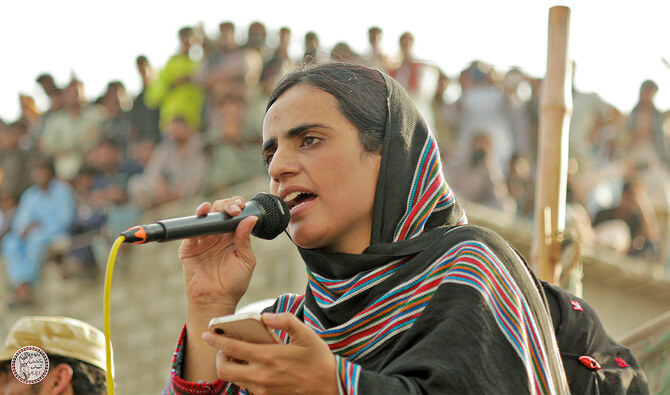ISLAMABAD: A Pakistani doctor and ethnic Baloch rights activist has been named in Time magazine’s annual list of the world’s 100 emerging leaders for “advocating peacefully for Baloch rights,” the magazine said this week.
In 2019, Time began publishing the Time100 Next list, which “spotlights 100 rising stars who are shaping the future of business, entertainment, sports, politics, science, health and more.”
Over the past two decades, a state crackdown on a separatist insurgency in Pakistan’s impoverished, southwestern Balochistan province has led to widespread allegations of enforced disappearances and extrajudicial killings that families, activists and politicians blame on security forces, who deny involvement.
Baloch, 31, became an activist as a teenager after her father, activist Abdul Gaffar Langove, disappeared in 2009. She was 16 at the time and immediately started protesting his abduction — which she blamed on Pakistani security forces — and became known in the student resistance movement in Balochistan. In July 2011, Langove’s body was found bearing signs of torture.
Baloch now leads the Baloch Yakjehti Committee civil rights movement, and last December led hundreds of women in a long march to the Pakistani capital, Islamabad, demanding justice for their “disappeared” husbands, sons, and brothers. Earlier this year, she organized the Baloch Raji Muchi gathering in the strategic port city of Gwadar, an event aimed at uniting the Baloch against rights abuses.
“With many of the community’s men missing or dead, women like Mahrang are now at the helm advocating peacefully for Baloch rights,” Time wrote as it announced this year’s Time100 Next.
Baloch’s actions had brought “unprecedented attention to the Baloch struggle,” Time said, and the activist believed the momentum she had built would carry on.
“There is a lot of threat. There is a lot of oppression,” she was quoted as saying by Time. “Still ... we will struggle for humanity.”
Not everyone is a fan of Baloch.
Addressing a press conference in August, the military spokesperson Lt. Gen. Ahmad Sharif Chaudhry said the purpose of the BYC and the Baloch Raaji Muchi it had convened in July in Gwadar, where China is building a deep sea port, was to make development projects and investments “controversial” and incite people against the Pakistan army and other security forces involved in operations against insurgency and crime in Balochistan.
“This Raaji Muchi, this is a proxy of terrorists and criminal mafia that has been exposed,” Chaudhry told reporters.
“This is what the reality is. They are nothing more than proxy of terrorist organizations and illegal smugglers, this is a mafia.”
















